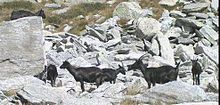 | |
| Conservation status | FAO (2007): not at risk |
|---|---|
| Other names |
|
| Country of origin | Switzerland |
| Distribution |
|
| Standard | MIPAAF |
| Use | milk, also meat |
| Traits | |
| Weight |
|
| Height |
|
| Coat | black |
| Face colour | black |
| Horn status | horned in both sexes |
| Beard | males bearded |
| |
The Nera Verzasca, also known as the Nera di Verzasca or Verzaschese, is a Swiss breed of black domestic goat from the Valle Verzasca, in the canton of Ticino in southern Switzerland, from which it takes its name. It is raised in that area and in the provinces of Como, Varese and Verbano Cusio Ossola in northern Lombardy, in the north of Italy.
Numbers
In Italy, the Verzaschese is one of the forty-three autochthonous goat breeds of limited distribution for which a herdbook is kept by the Associazione Nazionale della Pastorizia, the Italian national association of sheep- and goat-breeders. In Switzerland the Nera Verzasca is among the endangered breeds for which a herdbook is kept by the Schweizerischer Ziegenzuchtverband or Federazione svizzera d'allevamento caprino, the Swiss federation of cantonal goat breeders' associations. In 2010 the total population in the two countries was 3014, of which 1902, or about 63%, were in Italy. At the end of 2013 the registered population in Italy was variously reported as 1388 and as 1529, and that in Switzerland was 2200–2300.
Use
The average milk yield per lactation of the Nera Verzasca was measured in 2003 at 185 litres for primiparous, 318 litres for secondiparous, and 365 litres for pluriparous, nannies; a study in 2008–10 found an average yield of 373 litres in 208 days, with an average of 3.50% fat and 3.06% protein. In Italy the milk is used to make caprino cheeses such as Formaggella del Luinese, which has DOP status, while in Switzerland much of it is made into Büscion, a fresh goat's-milk cheese; ricotta is made in both areas.
Kids are slaughtered at an average age of 41 days, at an average weight of 14 kg.
References
- Barbara Rischkowsky, D. Pilling (eds.) (2007). List of breeds documented in the Global Databank for Animal Genetic Resources, annex to The State of the World's Animal Genetic Resources for Food and Agriculture. Rome: Food and Agriculture Organization of the United Nations. ISBN 9789251057629. Accessed June 2014.
- ^ Daniele Bigi, Alessio Zanon (2008). Atlante delle razze autoctone: Bovini, equini, ovicaprini, suini allevati in Italia (in Italian). Milan: Edagricole. ISBN 9788850652594. p. 406–07.
- ^ Lorenzo Noè, Alessandro Gaviraghi, Andrea D'Angelo, Adriana Bonanno, Adriana Di Trana, Lucia Sepe, Salvatore Claps, Giovanni Annicchiarico, Nicola Bacciu (2005). Le razze caprine d'Italia (in Italian); in: Giuseppe Pulina (2005). L' alimentazione della capra da latte. Bologna: Avenue Media. ISBN 9788886817493. p. 381–435. Archived 5 October 2014.
- ^ Norme tecniche della popolazione caprina "Verzaschese": standard della razza (in Italian). Associazione Nazionale della Pastorizia. Accessed June 2014.
- Strutture Zootecniche (Dec. 2009/712/CE - Allegato 2 - Capitolo 2) (in Italian). Ministero delle Politiche Agricole Alimentari e Forestali. Section I (e). Archived 4 May 2014.
- Le razze ovine e caprine in Italia (in Italian). Associazione Nazionale della Pastorizia: Ufficio centrale libri genealogici e registri anagrafici razze ovine e caprine. p. 115. Accessed June 2014.
- ^ Giorgio Zanatta, G. Bruni, Lisa Pirovano, L. Ferrari (). "Principali parametri tecnici ed economici degli allevamenti della capra nera di verzasca" (in Italian). In: Paolo Clarà (ed.) (). Valorizzare l'allevamento e i prodotti della razza autoctona Nera di Verzasca negli ecosistemi montani. Comunità Montana Valli del Verbano. Accessed June 2014.
- Consistenze Provinciali della Razza 93 Verzaschese Anno 2013 (in Italian). Associazione Nazionale della Pastorizia: Banca dati. Accessed June 2014.
- Breed data sheet: Verzaschese/Italy. Domestic Animal Diversity Information System of the Food and Agriculture Organization of the United Nations. Accessed June 2014.
- Breed data sheet: Nera Verzasca/Switzerland. Domestic Animal Diversity Information System of the Food and Agriculture Organization of the United Nations. Accessed June 2014.
| Goat breeds of Switzerland | |
|---|---|